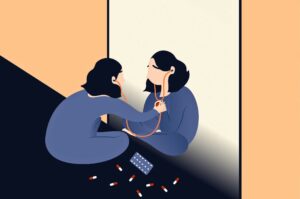If you’re one of the millions of people who suffer from health anxiety, you know how debilitating it can be. You may worry constantly about having a serious illness, even when there is no evidence to support your fears. If you’re struggling with health anxiety, Cognitive Behavioral Therapy (CBT) may be able to help. In this blog post, we will discuss CBT for health anxiety and what you need to know before starting treatment.
Contents
- 1 What Is The CBT Model For Health Anxiety?
- 2 What Techniques Are Involved In CBT For Health Anxiety?
- 3 How Many Sessions Of CBT For Health Anxiety?
- 4 What Are The Benefits You Can Expect?
- 5 Which Is The Most Effective Way To Manage Health Anxiety?
- 6 Are There Any Drawbacks Of CBT For Health Anxiety?
- 7 How To Find CBT Therapy Near Me?
- 8 Conclusion
What Is The CBT Model For Health Anxiety?
 The Cognitive Behavioral Therapy (CBT) model for health anxiety is based on the premise that our thoughts, emotions, and behaviors are intertwined. And all can have a major impact on how we see ourselves and our physical health. This approach to treating health anxiety focuses on helping individuals challenge their irrational worries about their physical health. And replace them with more realistic beliefs about their health.
The Cognitive Behavioral Therapy (CBT) model for health anxiety is based on the premise that our thoughts, emotions, and behaviors are intertwined. And all can have a major impact on how we see ourselves and our physical health. This approach to treating health anxiety focuses on helping individuals challenge their irrational worries about their physical health. And replace them with more realistic beliefs about their health.
It is believed that health anxiety can be a result of dysfunctional beliefs about health. Such as the belief that one is vulnerable to physical illness and injury. CBT helps individuals identify these irrational thoughts and replace them with more realistic perspectives on their health.
The CBT model is simply a way of thinking about the underlying causes of health anxiety. It emphasizes that it is our thoughts and behaviors which are causing us to experience symptoms, rather than the physical illness itself. By addressing these cognitive and behavioral patterns, CBT can help to reduce health anxiety by changing how an individual thinks and behaves in response to their fears.
What Techniques Are Involved In CBT For Health Anxiety?
There are several techniques used in CBT for health anxiety. Some of the common ones are listed below:
1. Cognitive Restructuring: Through this technique, people learn to identify and challenge distorted thinking patterns that fuel their health anxiety.
2. Exposure Therapy: This type of therapy exposes individuals gradually to the things they fear in order to help them become desensitized and less anxious about them.
3. Self-Monitoring: People use this technique to monitor their thoughts, feelings and behaviors in order to better understand how their health anxiety affects them.
4. Relaxation Training: This type of therapy helps individuals cope with symptoms of anxiety and stress by teaching them relaxation techniques such as deep breathing, progressive muscle relaxation, guided imagery, and mindfulness meditation.
5. Mindfulness: This technique involves being mindful and aware of the present moment in order to gain perspective on thoughts and feelings.
6. Behavioral Activation: This technique encourages people to engage in activities that make them feel better, even if they don’t want to do them initially.
These techniques are used together with lifestyle changes such as exercise, healthy eating, and getting enough sleep in order to reduce anxiety. Through CBT, people can learn how to manage their health anxiety more effectively and start living a healthier life.
By integrating these techniques into everyday life, individuals can begin to build the resilience needed to manage their health anxiety. With the help of a trained professional, people can learn how to recognize and cope with their anxiety in a healthy way.
How Many Sessions Of CBT For Health Anxiety?
 When you are being treated for health anxiety, the number of sessions of CBT you need can vary depending on the severity of your symptoms. Generally, a treatment course will last for 6-10 weekly sessions.
When you are being treated for health anxiety, the number of sessions of CBT you need can vary depending on the severity of your symptoms. Generally, a treatment course will last for 6-10 weekly sessions.
However, this may vary depending on how quickly you respond to treatment and other factors such as:
- The intensity of your symptoms
- Any complicating issues such as depression
- Your motivation to engage in treatment
- The complexity of the issues you are dealing with
In some cases, a course of CBT may be complete after 6-8 sessions or it may take longer. It is important to discuss your expectations and goals for treatment with your therapist. So, an appropriate number of sessions can be planned.
The therapist will also help you to develop strategies for managing your health anxiety. And any other associated issues in between sessions. So you can continue to make progress even when not in treatment.
What Are The Benefits You Can Expect?
If you have chosen CBT for health anxiety, then you can expect a range of benefits. That may help to reduce symptoms and improve overall well-being. A few common benefits are:
- Improved ability to identify and challenge negative thoughts: Cognitive Behavioral Therapy helps you identify, challenge, and replace unhelpful or distorted thinking patterns. Such as catastrophizing or overestimating the danger involved in a situation.
- Increased self-awareness: CBT helps you become more aware of your emotions, thoughts, and behaviors. This can help you better understand how your anxiety is affecting your life. As well as develop strategies for managing it more effectively.
- Greater problem-solving skills: CBT also helps you develop healthier coping strategies so that you are better able to tackle any problems or difficult situations in a more constructive manner.
- Improved relationships: By learning to better manage your anxiety and distress, you can also improve the quality of your relationships with others.
- Increased self-confidence: You may find that CBT helps you feel more confident in yourself and your abilities. That can lead to an improved sense of overall well-being.
- Reduced physical symptoms of anxiety: CBT can also help reduce physical symptoms such as a racing heart, sweating, and muscular tension.
By taking part in CBT for health anxiety, you can expect these benefits to last long-term. With the help of a qualified therapist, you can develop the tools needed to manage your anxiety more effectively.
Which Is The Most Effective Way To Manage Health Anxiety?
 As health anxiety is a condition that can cause considerable distress. Then, it is important to take steps to manage the symptoms in order to reduce their impact on daily life. Though CBT is considered the best approach to tackle health anxiety, the following are some of the most effective other ways to manage health anxiety:
As health anxiety is a condition that can cause considerable distress. Then, it is important to take steps to manage the symptoms in order to reduce their impact on daily life. Though CBT is considered the best approach to tackle health anxiety, the following are some of the most effective other ways to manage health anxiety:
1. Mindfulness: Practicing mindful activities such as yoga and meditation can help to create a sense of well-being. And bring clarity when worrying thoughts arise.
2. Exercise: Regular exercise helps to release endorphins, which are hormones that act as natural antidepressants. And reduce stress levels. Even moderate exercise like walking or swimming can help to reduce anxiety and improve overall health.
3. Connect With Others: Talking with friends, family or a professional therapist can help to alleviate feelings of worry. As well as provide an outlet for venting stress and providing emotional support.
4. Get Educated: Learning more about the condition and its symptoms can be helpful in reducing fear and worry. Knowing more about health anxiety and what to expect can help to lessen the fear of encountering a dreaded symptom or potential illness.
5. Practice Healthy Habits: Adopting healthy lifestyle habits such as eating nutritious meals, drinking plenty of water, and getting enough rest can all help to reduce stress levels and maintain physical health.
With all these best practices in mind, it is important to remember that managing health anxiety involves a lot of personal effort and dedication. It is also beneficial to experiment with different approaches until the individual finds what works best for them. With the right tools and support, health anxiety can be effectively managed and treated.
Are There Any Drawbacks Of CBT For Health Anxiety?
Well, it is a first-line treatment that has been shown to be effective in many clinical studies. However, it is important to note that there may be some drawbacks to using CBT for health anxiety specifically. Some of these are:
- First and foremost, the treatment can become time-consuming if the patient does not commit fully. It requires patience and dedication as certain techniques may take several sessions over a period of time to become effective.
- Additionally, some people may struggle to engage in the ‘homework’ that is associated with CBT and this can reduce its effectiveness.
- Another potential drawback is that CBT can require the patient to face their fears, which can be challenging and even distressing.
- Finally, as it is largely based on changing thought patterns and behaviors, some people may struggle to make changes in this way. And thus not benefit from the treatment.
Overall, although there are some potential drawbacks to using CBT for health anxiety, it is widely recognized as an effective treatment. In fact, you can see the large drawbacks are from a lack of commitment on behalf of the patient. And this is something that should be discussed with your therapist prior to beginning treatment. With dedication, motivation, and an understanding of how CBT works, you can enjoy the many benefits it has to offer.
How To Find CBT Therapy Near Me?
Now, this is something that seems a bit daunting at first, but it doesn’t have to be. There are a few different ways you can go about finding local CBT therapists and services in your area. Some tips are given below:
- Word of mouth: Whether you talk to a friend or family member, they may be able to point you in the direction of a quality therapist in your area.
- Online directories: A great way to find therapists near you is to search online directories like Mantra Care and TherapyMantra. They offer comprehensive listings of local therapists offering CBT as well as other forms of therapy.
- Insurance: If you have insurance coverage, it’s worth checking with your provider to see if they can recommend any CBT therapists in your area.
- Mental health associations: Professional associations, such as the American Psychological Association, can provide you with a list of their licensed members who specialize in CBT.
- Local hospitals: Hospitals are a great resource for finding local therapists, and many offer referral services or mental health clinics that provide CBT.
Finally, it’s important to remember that finding the right therapist can take time and may require doing some research. Don’t be afraid to ask questions or get more information in order to make sure you’re getting the best care possible.
Conclusion
To conclude, CBT for health anxiety is being increasingly used as a reliable and safe way to address health anxiety symptoms. It can help an individual gain control over their thoughts, feelings, and behaviors in order to better manage their anxieties and worries. Doing so can provide relief from the physical, psychological, and emotional distress that health anxiety can cause.
For more information, please contact MantraCare. Anxiety is a feeling of fear, worry, and unease often related to an upcoming event or uncertain outcome. If you have any queries regarding Online Anxiety Counseling experienced therapists at MantraCare can help: Book a trial Anxiety therapy session


